|
|
|
Sort Order |
|
|
|
Items / Page
|
|
|
|
|
|
|
| Srl | Item |
| 1 |
ID:
120151


|
|
|
|
|
| Publication |
2013.
|
| Summary/Abstract |
Why and how can historical cases support different assessments of China rising with respect to the possibility of its becoming China threat? Rationalists and strategic culture analysts, who predominantly look at China from an external position, debate the influence of power, strategic cultures, and identities in explaining this highly controversial question. We, however, develop an internal view from the standpoint of a China looking out, which argues that different sources of Chinese self-role concepts could yield different policy behaviour. We analyse two discourses on Chinese foreign policy that have emerged in the 21st century-core national interest and harmonious world. We then introduce the dialectic approach of harmonious realism wherein indecisiveness is the essential characteristic. It is failure to decide on the specific purpose of Chinese foreign policy that creates China's self-role conflict. Harmonious disciplining, balance, racism, and intervention are the practical forms of China's harmonious realism through which the contemporary case analysis explains the forms, actual policy, and behavioural consequences of China's self-role conflict.
|
|
|
|
|
|
|
|
|
|
|
|
|
|
|
|
| 2 |
ID:
085847
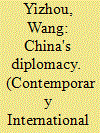

|
|
|
|
|
| Publication |
2009.
|
| Summary/Abstract |
After three decades of reform and opening up, China's diplomacy displays the following ten features:1. the three interlocked goals of development, sovereignty and responsibility; 2. maintaining "a low profile" while "acknowledging some accomplishments"; 3. a principled, yet restrained stance in pushing for an improved international order. 4.multi-tiered, mutually complementary diplomatic endeavors; 5. four close-knit diplomatic fronts; 6. the intrinsically compatible concepts of "a harmonious society" and "a harmonious world"; 7. the renewed principle of non-intervention; 8. the evolving "people first" concept thinking; 9. guidelines with continuity and innovation; 10. an orderly, gredualist diplomacy diplomatic transition.
|
|
|
|
|
|
|
|
|
|
|
|
|
|
|
|
| 3 |
ID:
138965
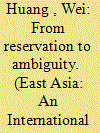

|
|
|
|
|
| Summary/Abstract |
I examine the views of Chinese scholars during the decade of Hu’s leadership concerning China’s diplomatic strategy with respect to the judgment of China’s national power, the orientation of China’s diplomatic goals, and the choice of China’s foreign policy. Chinese scholars increasingly judged China as an emerging major power in a multi-polarizing world. The mainstream academic attitude was that China should augment its international role. The discourse on China’s diplomatic goals experienced a skillful and tacit transition from the “keep a low profile” principle to the “harmonious world” proposal, featured by the shift in emphasis, the expansion of interpretation, and the substitution of concepts. The Chinese academia unanimously endorsed the governmental proposal of the road of peaceful development, while ambiguity can be observed in China’s more assertive responses to challenges to its “core interests”, agenda setting attempts in multilateral cooperation, and various endeavors to gain “soft power”. Underlying the transition of China’s diplomatic strategy was the materialist way of thinking concerning international relations.
|
|
|
|
|
|
|
|
|
|
|
|
|
|
|
|
| 4 |
ID:
116211
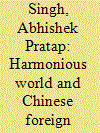

|
|
|
| 5 |
ID:
099588
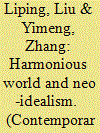

|
|
|
| 6 |
ID:
113704
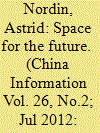

|
|
|
|
|
| Publication |
2012.
|
| Summary/Abstract |
China's modernization and rise is commonly understood as a key factor that will shape future world order. This article examines narratives at Expo 2010 Shanghai China as an instance of the local constitution of this future world. Such imaginations of China and/in the world actively create the future, through assumptions about time and space that structure the possible imaginations of China, the World, and their interrelation. This article examines how the technological and conceptual innovations that play out at the Expo draw on two common cosmologies, the 'unit-based' cosmology of the international state system and a Chinese 'holistic' imaginary of tianxia (all-under-heaven). It shows how these two cosmologies order universal/particular, time/space, and self/other through Beijing's 'harmonious world' policy. It argues that the two cosmologies are not mutually exclusive, but are deployed at the Expo in ways that reinforce one another by ordering spatial difference through teleological time. The effect is a story of China and the World where others are not different; they are just behind. This is a problem because the reduction of spatial difference to place in a historical queue makes it difficult to imagine plural futures, as opposed to The Future already inscribed in the story.
|
|
|
|
|
|
|
|
|
|
|
|
|
|
|
|
| 7 |
ID:
113703
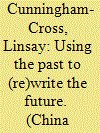

|
|
|
|
|
| Publication |
2012.
|
| Summary/Abstract |
To many in China, their country's rise is not simply a hard power phenomenon; China's new weight in international affairs demands that it also innovates culturally to offer new global norms to the world. Thus in recent years many prominent Chinese scholars have invested significant time and resources into searching for, or attempting to define, a distinctly Chinese approach to theorizing international relations. One of the potential sources often cited as a foundation for such an approach is China's long and rich history of political theorizing and political/cultural leadership. This article considers one of the key contributions to that debate from a Tsinghua University scholar, Yan Xuetong. Despite his rejection of the 'China school' project, Yan has invested significant resources in a project that seeks to apply pre-Qin thought to contemporary international politics. Through a careful reading of this work, the article reveals a compelling narrative about China's future rise. It argues that through discursively linking pre-Qin classical texts with China's modern rise, Yan Xuetong is using China's past to write its, and the world's, future. The article critically engages with this future Yan is narrating, and considers some of the implications it might have for China and the world.
|
|
|
|
|
|
|
|
|
|
|
|
|
|
|
|
|
|
|
|
|